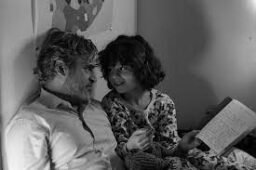REVIEW: The Letters: Packing a Larger than Life Person into a Regular Life Film
- December 29, 2015
- by
- Josh Godwin
Mother Theresa is one of those enigmatic figures of the twentieth century that continues to toy and tickle the imagination of the world decades after her life ended. Her life was defined by compassion, led by faith, and encouraged by the fullest extent of perseverance. However, few examples before have revealed the inner turmoil and struggle that Mother Theresa endured throughout her time in ministry as The Letters (2015). Written and directed by William Riead (Scorpion [1986], Island Prey [2001]), this biopic portrays the story of Sister Theresa, rebel nun and compassionate alien in Calcutta, India. Through the description of letters written to her friend Father Celeste van Exem throughout her time living amongst the people of India, Riead offers a poignant and palpable depiction of Mother Theresa’s challenges during her life of service.
What is compelling about Mother Theresa’s story is the powerful dedication of this singular individual in the face of so much widespread suffering. Riead does a wonderful job of capturing the raw power of the narrative, displaying the rampant poverty and sickness that Mother Theresa combated on the screen. What could threaten as an inundation of emotion instead is an honest representation of human suffering. Although such raw emotion is at the basis of many powerful stories, there is something extremely moving when such stories are based on real events.
The Letters has such an advantage of building a film narrative on top of one of the most powerful narratives of suffering and healing the world has ever seen. While building this narrative progressively on letter from Sister Theresa (Juliet Stevenson) to Father Celeste van Exem (Max von Sydow) offers a structural framework to work with, it can make the plot of the film seem episodic. Couple this with the sometimes groggy narration and the film can become bogged down in the plot progression in what should be a naturally moving and progressive film. However, the sins of production are not enough to condemn the poignant story of a compelling character and person.
It would have been impossible to capture the true magnitude of the story of Mother Theresa within a single film. Her life was simply too powerful, her story too moving, her ministry too miraculous. So maybe the film does feel like it comes a little short of the full Mother Theresa story, and it should.
It’s unfair to hold any film to the quality of life that Mother Theresa realized. What this does accomplish to the greatest of its potential is to present a glimpse into the extraordinary life of an even more extraordinary individual. Mother Theresa was the epitome of what the mission of Jesus was and is meant to be: compassionate, loving, and sacrificial to the fullest extent. There is no way that any film could truly convey the reality of what this life and ministry looked or felt like. However, The Letters does place the audience in a space that makes it possible to glimpse, even for just a moment, what it meant for Mother Theresa to live and feel the life she endeavored to fulfill, full of all the joys, the hurts, the injuries, and the healings. The Letters opens up the real human heart of such an amazing story within the life and ministry of Mother Theresa, a powerfully prayerful and compassionate woman of God in the midst of a suffering and hurting cacophony of people she embraced in Calcutta.






